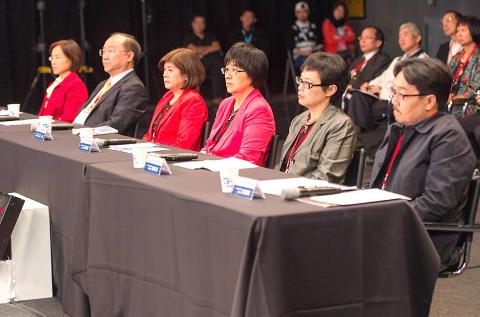Some civic organizations yesterday joked that they may shy away from being called “civic groups” after questions posed by some of the groups at Friday’s debate between Chinese Nationalist Party (KMT) Taipei mayoral candidate Sean Lien (連勝文) and independent candidate Ko Wen-je (柯文哲) were seen as being obviously biased against Ko.
Friday night’s televised debate included a session in which the candidates answered questions from six civic groups.
Netizens have said that questions asked by Taiwan Competitiveness Forum chairman Thomas Peng (彭錦鵬) favored the Lien camp and sought to embarrass Ko.

Photo provided by SET TV
Peng asked Lien how he intends to increase Taipei’s competitive edge as mayor and why he was willing to “risk his life” and run for the post after brushes with death — once when he was shot in the face and another when he was diagnosed with cancer.
Peng then asked Ko about National Taiwan University Hospital’s MG149 account, which he contended was illegal, and asked why Ko had been “exempt from the rule of law” in this case.
The cases refers to allegations that Ko siphoned money from the account for his personal use. After the claims surfaced, hospital president Huang Kuan-tang (黃冠棠) said that the MG149 account was “clean” and the National Audit Office’s probe found no evidence of unlawful activity.
Commenting on civic groups’ actions in the debate, Chen Chao-chien (陳朝建), assistant professor at Ming Chuan University’s department of public affairs, yesterday said that groups do not necessarily have to be politically neutral.
He added that if individuals from a group go on air to ask questions supposedly representing the public, they should seek to be fair and abide by the proper procedures to the best of their ability.
In situations like Friday night’s, members should not be in contact with a political camp in advance and should not seek to twist the truth or mislead people, Chen said, adding that it was inappropriate for a panelist to be blatantly biased.
Judicial Reform Foundation member Kao Yung-cheng (高涌誠) added that groups typically avoid receiving large donations to avoid undue influence.
Lee Li-fen (李麗芬), secretary-general of the group End Child Prostitution, Child Pornography and Trafficking of Children for Sexual Purposes in Taiwan, said that her group will work with any official on policies that will help end exploitation.

CHAOS: Iranians took to the streets playing celebratory music after reports of Khamenei’s death on Saturday, while mourners also gathered in Tehran yesterday Iranian Supreme Leader Ayatollah Ali Khamenei was killed in a major attack on Iran launched by Israel and the US, throwing the future of the Islamic republic into doubt and raising the risk of regional instability. Iranian state television and the state-run IRNA news agency announced the 86-year-old’s death early yesterday. US President Donald Trump said it gave Iranians their “greatest chance” to “take back” their country. The announcements came after a joint US and Israeli aerial bombardment that targeted Iranian military and governmental sites. Trump said the “heavy and pinpoint bombing” would continue through the week or as long

TRUST: The KMT said it respected the US’ timing and considerations, and hoped it would continue to honor its commitments to helping Taiwan bolster its defenses and deterrence US President Donald Trump is delaying a multibillion-dollar arms sale to Taiwan to ensure his visit to Beijing is successful, a New York Times report said. The weapons sales package has stalled in the US Department of State, the report said, citing US officials it did not identify. The White House has told agencies not to push forward ahead of Trump’s meeting with Chinese President Xi Jinping (習近平), it said. The two last month held a phone call to discuss trade and geopolitical flashpoints ahead of the summit. Xi raised the Taiwan issue and urged the US to handle arms sales to

BIG SPENDERS: Foreign investors bought the most Taiwan equities since 2005, signaling confidence that an AI boom would continue to benefit chipmakers Taiwan Semiconductor Manufacturing Co’s (TSMC, 台積電) market capitalization swelled to US$2 trillion for the first time following a 4.25 percent rally in its American depositary receipts (ADR) overnight, putting the world’s biggest contract chipmaker sixth on the list of the world’s biggest companies by market capitalization, just behind Amazon.com Inc. The site CompaniesMarketcap.com ranked TSMC ahead of Saudi Aramco and Meta Platforms Inc. The Taiwanese company’s ADRs on Tuesday surged to US$385.75 on the New York Stock Exchange, as strong demand for artificial intelligence (AI) applications led to chip supply constraints and boost revenue growth to record-breaking levels. Each TSMC ADR represents

State-run CPC Corp, Taiwan (CPC, 台灣中油) yesterday said that it had confirmed on Saturday night with its liquefied natural gas (LNG) and crude oil suppliers that shipments are proceeding as scheduled and that domestic supplies remain unaffected. The CPC yesterday announced the gasoline and diesel prices will rise by NT$0.2 and NT$0.4 per liter, respectively, starting Monday, citing Middle East tensions and blizzards in the eastern United States. CPC also iterated it has been reducing the proportion of crude oil imports from the Middle East and diversifying its supply sources in the past few years in response to geopolitical risks, expanding